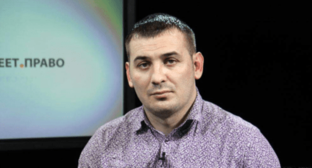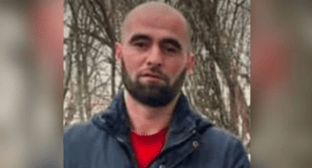24 October 2005, 16:19
Nalchik attack caused by repressions
Larissa Dorogov of the Nalchik State Bar has provided Caucasian Knot with her correspondence with the government concerning violations of the rights of Muslims in the republic which she has been in over the past few years.
According to her, repressions against Muslims in Kabardino-Balkaria began in 1998 when an armed group of certain Atabiyev who had received military training in Chechnya and returned to the republic was destroyed in the forest near Khasania, Nalchik.
In response to Atabiyev's destruction, the building of the Internal Affairs Ministry was shot at in several days. After that, a real hunt for Muslims began. Around 100 people were detained, their beards shaved forcibly. Since then, when any emergency happened in Kabardino-Balkaria, law enforcement agencies persecuted Muslims.
Thus, when Chechen rebel leader and terrorist Shamil Basayev visited Baksan from where he safely departed from an encircled house, several dozens of Muslims resident in Baksan were detained. According to one of them, they were beaten cruelly and then had crosses clipped on their heads. Smaller incidents such as a grenade explosion near the house of a police chief also served as a ground for repressions. As for a major incident such as the attack on Kabardino-Balkaria's Department of the Federal Service on Control of the Circulation of Drugs in December last year, practically all young Muslims became personae non grata. Instead of searching for those guilty by means of subtle secret-service work, republican law enforcement agencies began repressions, thereby expanding the ranks of supporters of aggressive Wahhabis, the lawyer maintains.
All that time, Muslims were applying to various authorities requesting protection from the actions of law enforcement and security agencies.
An excerpt from a letter to Vladimir Lukin, Commissioner on Human Rights in the Russian Federation, reads: "In August 2004, without any legal grounds, without any claims or lawsuits, without any decisions on the part of the judiciary, and counter to objections and indignation of Muslims, five mosques were closed in Nalchik simultaneously (which testifies to a political action against Muslims) which have since remained closed in spite of endless requests and applications to various authorities. They were closed and sealed forcibly by Internal Affairs Ministry agencies.
Thus, mosques were closed: in the Volnyi Aul micro-district; in the Aleksandrovka micro-district; in the Iskozh micro-district; the Nur mosque; and the mosque in Severnaia St. Another mosque (the former central one) has been completely pulled down once construction of a new mosque in the city centre had begun, although this new mosque cannot meet the needs of Muslim prayers in the city. But even this mosque only works according to a schedule. It is opened only in prayer time and is closed at once, allegedly as ordered by the government of the republic. The schedule signed by the Chairman of the Spiritual Board of Muslims hangs on the door of the mosque.
"According to the Federal Law 'On freedom of conscience and on religious associations,' believers have the right to group prayer, whereas Muslims are deprived of this God's favour with mosques closed. Meanwhile, if several Muslims gather together to perform the salah (the five daily prayers obligatory for Muslims — ed.) at the place of one of them, searches begin to be conducted every day in this house, which is real persecution. Since August 2004, younger and healthier Muslims have continued to perform group salah and the obligatory Friday prayer near the closed mosque in their district, also when it was raining or snowing, but even so it has not got by without excesses, constant spying, and preventing on the part of the police, whereby they insulted the feelings of the believers and deprived them of the right to freedom of religion."
In her reply of 24 June 2005, Mikhail Odintsov, chief of the Human Rights Commissioner's Department for Cooperation with Public Organisations, says that in compliance with Article 20 of the Federal constitutional law "On the Commissioner on Human Rights of the Russian Federation" the letter had been forwarded to the Prosecutor's Office of the Republic of Kabardino-Balkaria "for a comprehensive examination and taking of measures by way of prosecutor's reaction."
A similar reply was received from the Department for written applications of citizens at the Administration of the President of the Russian Federation on 14 June 2005. "We hereby inform you that your application addressed to the President of the Russian Federation has been forwarded for examination to the Administration of the President of the Republic of Kabardino-Balkaria." Before that, on 13 May, 2005, the Russian president's administration had informed Ms Larissa Dorogov that her complaint about violations of the rights of Muslims in the republic had been "forwarded to the Prosecutor of the Republic of Kabardino-Balkaria, Yuri M. Ketov, with a request to advise you if the results, and is controlled by the staff for the envoy of the President of the Russian Federation in the South federal district."
Kabardino-Balkaria's Prosecutor's Office did not find "violations of the constitutional rights of citizens to freedom of conscience and religion." In the opinion of the prosecutor, "religious needs of Muslims in Nalchik can fully be satisfied in connection with the opening of the central mosque in 2004 which admits up to 800 people."
The prosecutor also informs that a division of the Investigation Department of the Prosecutor's Office of Kabardino-Balkaria performed another examination with reference to bodily harm committed to Messrs R. Matarov, D. Chudov, A. Boluyev, D. Bittirov, A. Getazheyev, Z. Bakhov, V. Gutov, O. Kardanov, S. Boziyev, B. Dzagalov, Z. Abidov, M. Karmov, and Ms K. Aripshev, but did not find "grounds to take measures by way of prosecutor's reaction."
The Russian Prosecutor General's Office in its reply writes that "inconsiderable reduction of the number of non-residential premises adapted for mosques was due to expiry of rental contracts between the city and religious organisations." Meanwhile, Ms Dorogov claims that expiry of rental contracts is just a formal pretext. Thus, the Cosmos movie theatre in Volnyi Aul was provided for the mosque on a permanent and free basis.
In the end, 400 Muslims from Kabardino-Balkaria wrote a letter and sent it to a number of authorities demanding that they should be allowed to emigrate to any Arab or European country where the rights of believers are observed.
Many media outlets covered on this event, after which, finally, an officer of the Federal Security Service Department for Kabardino-Balkaria met Ms Dorogov and offered her organising a meeting between the authors of the letter and the leadership of the Federal Security Service Department. However, the meeting did not occur on the day it was scheduled for.
In its reply, the Department for Humanitarian Cooperation and Human Rights at the Foreign Affairs Ministry of the Russian Federation writes the following: "As for the facts set out which are the reason for your wish to emigrate from the Russian Federation, in the absence of an adequate reaction on the part of internal affairs agencies to your application, you are entitled to apply both to a higher authority within the Internal Affairs Ministry of Russia and to the Commissioner on Human Rights, Vladimir P. Lukin."
Experts think that the attack on Nalchik was provoked by the attitude of the government of Kabardino-Balkaria towards Muslims. "It is not ruled out that this (the events in Nalchik on 13 October — CK) became a response to a special operation which law enforcement agencies have been conducting recently to reveal members of the Jamaat (Society) of Kabardino-Balkaria," Akhmet Yarlykapov, PhD in history and a research fellow at the Institute of Ethnology and Anthropology of the Russian Academy of Sciences, told Caucasian Knot's correspondent.
Author: Lyudmila Maratova, CK correspondent




